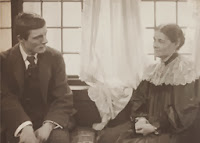Repeat from the Beginning!
In 1914, at the height of a successful career as concert pianist, Donald Francis Tovey (1875–1940) became the [John] Reid Professor of Music at the University of Edinburgh. There he worked for the rest of his career, and his previous experience as full-time performing musician came to shape every aspect of his work: teaching, conducting the Reid Orchestra (which he founded in 1917), editing, and especially writing.
Tovey’s serious, often lengthy program notes had been a hallmark of his concerts from the beginning (and in Edinburgh, program notes had been the tradition since the first Reid concerts in the 1840s). Reviews from his early career complain of their detail and high literary style. But he was resolute in his belief that followers of his piano concerts and, later, the faithful public of the Reid Orchestra might follow the arguments of classical music. What resulted, of course, were the Essays in Musical Analysis, six volumes of his program notes, collected and published 1935–39.
 |
| Frederick Hollyer: Donald Francis Tovey and Sophie Weisse Victoria & Albert Museum |
No one could have found Tovey’s decision to abandon his virtuoso career a more bitter pill than his piano teacher, Sophie Weisse (1851–1945). It was she who had provided the necessary introductions that led to Tovey′s important friendship with Joseph Joachim, and his appearance with the Joachim Quartet (1905, in the Brahms F-Minor Quintet). What became a family friendship led, in turn, to appearances of Joachim′s great nieces, the violinists Adila Fachiri and Jelly d′Aranyi, with the Reid Orchestra. And in 1927 (as electric recording was first achieving its stride), to her particular satisfaction, Fachiri and Tovey collaborated in a recording of Beethoven′s Violin Sonata in G Major, op. 96 (National Gramophonic Society 114, 115, 116, 117 [side one]). At the repeat in the first movement, Tovey famously barks: “Repeat from the Beginning! … Second time. … ”
- Symposium 1312: The Great Violinists, vol. XIX (2004) at Amazon (2004).
- At Spotify.
- Track 11: “Repeat … ” at Spotify.
In this most practical solution—pick up the needle and start over—to the space limits of early discs, we have a glimpse of how the experience of the listener was ever paramount among his concerns. (Most other early recordings just skip the repeat, as do many performers today, when disc space is no longer an issue.) That the listener hear the details on the musical surface mattered above all.
Not for Tovey the abstract notions of background. “Some day,” he writes of the Seventh Symphony, “an analyst may arise who will administer a drastic cure by persuading people to swallow the soul-stirring doctrine that every piece of music whatever is based on the one idea embodied in a figure of one single note.” Tovey′s most acerbic critic, BBC Radio 3′s program director Hans Keller, found his approach pandering—and to a provincial Edinburgh audience. That did not much stain the Essays and other writings that went on to give Tovey good name recognition, including in the United States. American writers of today admire both the insights and the iconoclasm, but also two very modern priorities: outreach and engagement.
Robert D. Pearson is Lecturer in Music History at the University of North Texas in Denton. His doctoral dissertation for Brandeis University (2011) concerned history, narrative, and analysis in Tovey′s writings.


